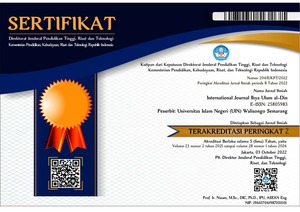Religious System in the Mughal Empire during the Period of Shah Jahan and Aurangzeb
DOI:
https://doi.org/10.21580/ihya.25.1.11681Keywords:
Mughal Sultanate, Policy, Socio-ReligiousAbstract
The advice of the Mughal was established by Zahiruddin Muhammad Babur when he succeeded in defeating Abraham Lodi in the battle of Panipat. It also managed to expose the influence of Islam on the Children of Benua India to becoming wider and then continued by its followers. This research aims to analyze the conditions of Mughal society at the time of Sultan Shah Jahan and Aurangzeb implementing their policies in the community, especially religion. This is done because the Indian Subcontinent is an area whose people are Hindu. The method used is library research. This is done to answer the main research question, achieve the study's purpose, and have relevance to the technique used. The method facilitates research by providing insight into Sultan Shah Jahan's and Aurangzeb's policies. In his politics, Shah Jahan tolerated his Hindu people in his activities. They are also assured of their security as citizens of their religion. Moreover, when Aurangzeb did not find a place in the synagogue to be a part of the synagogue, Aurangzeb was more pressed on the values of Islamic society.
Downloads
References
Ajzen, I. (1991). "The Theory of Planned Behavior." Organizational Behavior and Human Decision Processes Vol. 50(No. 2): 179–211. https://doi.org/10.1016/0749-5978(91)90020-T
Ali, K. (1980). History of India, Pakistan, and Bangladesh. Dhaka: Ali Publication.
Ali, M. N. (2017). "Kepemimpinan Shah Jahan di Kesultanan Mughal (1628-1658 M)." Jurnal Sejarah Peradaban Islam Vol. 1: 154–192. https://doi.org/10.30829/J.V1I1.929.
Ali, M. N. (2018). Hegemoni Politik Aurangzeb di Kesultanan Mughal India 1658-1707 M. Yogyakarta: UIN Sunan Kalijaga Yogyakarta.
Ali, M. N. (2020). "Kebijakan Umar ibn Abdul Aziz dalam Pemberantasan Korupsi." Warisan: Journal of History and Cultural Heritage Vol. 1(No. 2): 37–45. https://doi.org/10.34007/warisan.v1i2.305
Amrullah, A. (2016). Masjid Alamgir Varanasi Identitas Muslim Di Sungai Gangga. Jakarta. Retrieved from https://www.republika.co.id/berita/nt6clt1/masjid-alamgir-varanasi-identitas-muslim-di-sungai-gangga
Awalisanah. (n.d.). India Pada Masa Pemerintahan Shah Jahan (Kebijakan Politik 1628- 1658). Yogyakarta: Universitas Islam Negeri Sunan Kalijaga Yogyakarta.
Blake, S. P. (2002). Shahjahanabad; The Sovereign City In Mughal India 1639-1739. Cambridge: University Press.
Elliot, H. M. (1953). The History of India As Told By Its Own History. Calcutta: Susil Gupta (India) Ltd.
Fuhaidah, U. (2004). Kebijakan Keagamaan Sultan Aurangzeb di India (1658-1707 M). Yogyakarta: UIN Sunan Kalijaga Yogyakarta.
Karim, M. A. (2012). Sejarah Pemikiran dan Peradaban Islam. Yogyakarta: Bagaskara.
Khilafah. (n.d.). Ensiklopedi Tematis Dunia Islam Jilid 2. Jakarta: Ichtiar Baru Van Hoeve.
Maryam, S., Sodiqin, A., Abdurrahman, D., Herawati, Muhsin, I., Firdaus, I., Latifah, Z. (2009). Sejarah Peradaban Islam: Dari Masa Klasik hingga Modern (3rd ed.; S. Maryam, M. Wildan, A. Sodiqin, D. Abdurrahman, & M. A. M. Sya’roni, Eds.). Yogyakarta: LESFI.
Moreland, W. . (1994). From Akbar to Aurangzeb: A Study in Indian Economic History. Delhi: Low Price Publications.
Mukhia, H. (2004). The Mughal of Hindia. UK: Blackwell Published.
Musidi, B. (2012). India: Sejarah Ringkas Dari Prasejarah Sampai Terbentuknya Bangladesh. Yogyakarta: Uiversitas Sanata Dharma.
Pal, P. (1989). Romance of The Taj Mahal. London: Wilshire Boulevard.
Prasad, I. (1930). A Short History of Muslim Rule In India. Allahabad: Indian Press.
Rais, H. el. (2012). Kamus Ilmiah Populer. Yogyakarta: Pustaka Pelajar.
S.M Jaffar. (1936). The Mughal Empire from Babar to Aurangzeb. Peshawar: Kissa Khani.
Sarkar, J. (1912). History of Aurangzeb: Mainly Based on Persian Sources. Calcutta: Harisson Road.
Syarifah Isnaini. (2020). "Kebijakan Politik Keagamaan Sultan Akbar Agung dan Abul Muzaffar Muhiuddin Aurangzeb." Tasqofah & Tarikh: Jurnal Kebudayaan Dan Sejarah Islam Vol. 5(No. 2).
Thohir, A., & Kusdiana, A. (2006). Islam di Asia Selatan: Melacak Perkembangan Sosial Politik Islam di India, Pakistan, Bangladesh. Bandung: Humaniora.
Yunus, A. R., & Haif, A. (2013). Sejarah Islam Pertengahan. Yogyakarta: Ombak.
Downloads
Published
How to Cite
Issue
Section
License
By submitting an article to the journal, the author(s) agree to transfer the published article's copyright to the journal, which will act as the publisher. This means the journal will have the right to publish the article in various forms, including reprints. The journal will maintain the publishing rights to the published articles.
This work is licensed under Creative Commons Attribution-ShareAlike 4.0 International License.
In line with the license, authors and third parties (readers, researchers, and others) are allowed to share and adapt the material. In addition, the material must be given appropriate credit, provided with a link to the license, and indicated if changes were made. If authors remix, transform or build upon the material, authors must distribute their contributions under the same license as the original.



